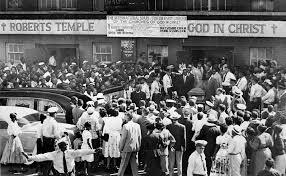Project Outline: Rituals of Remembrance: The Radical Power Of Black Grief

Supervised By:
Background:
Rarely do we hear the stories of individuals who lost their lives to racial violence as Black life is often reduced to statistics. Rodney King, Michael Brown, Emmett Till, Trayvon Martin, Breonna Taylor and George Floyd are a handful of people who prematurely died due to existing modes of racism. But, what do we actually know about these people other than the fact that they were victims of a much broader system of racial caste? This project unearths those stories, and highlights how, even in the wake of death, Black life continues to flourish. My findings will be interesting to others by providing education on the complexities of the Black experience thus promoting cross-cultural understanding.
It is well known that Black communities suffer from both slow and spectacular forms of death, including but not limited to mass incarceration and police violence. However, it is less known in dominant culture, how Black Americans have forged life, created traditions, built families, and consistently resisted all forms White supremacy in a variety of ways. This project is especially important to me because I have the privilege of learning about my ancestors while honoring their stories. Additionally, this projects seeks to make connections with the past and present, revealing the pervasive ways capitalism and white supremacy have manifested into various systems: slavery, Jim Crow, and mass incarceration to subjugate and police the Black body.
Research Question:
- How have Black people survived in the context of racial domination?
- What practices, traditions, and rituals animate Black life then and now?
Methodology:
My research will be carried out through a combination of ethnographic and archival methods that allow for a deep exploration of Black mourning practices. I will conduct ethnographic interviews and surveys to gather firsthand accounts and reflections from people connected to the lives we are researching. This includes family members and friends of individuals who were lost to racial violence, as well as activists, organizers, elected officials, and other civic leaders. Through these conversations, I aim to gain a fuller understanding of how grief operates not only as a personal experience but as a shared, political, and cultural force within the Black community.
At the same time, I will engage in extensive archival research to investigate the historical context that informs these lives and rituals. This includes tracing traditions of Black mourning and resistance from the Middle Passage, through slavery and Jim Crow, up to the present day. I will be working with archives at Columbia University and the New York Public Library, utilizing records, documents, photographs, and personal narratives that speak to Black experiences across generations. These materials will help map how mourning practices have evolved and endured as mechanisms of survival and resistance. This research will not be limited to famous figures, but will also highlight the often-overlooked lives of everyday people who were essential to their communities. By collecting and analyzing data across several lives, I hope to build a nuanced picture of the connection between grief, memory, and mobilization. As part of this process, I will help construct a research database that catalogs our findings which will combine oral histories, archival documents, and analytical notes that will serve as helpful source to my professor's main goals.
Objectives:
I hope communicate how Black grief has mobilized community action, fostered survival in the midst of racial violence, and animated Black life amongst a backdrop of erasure. This project is both a tribute to those who have come before and a celebration of the traditions that continue to carry Black communities forward. Intellectually, this project speaks to my broader interests in cultural memory, social movements, and Black resistance. Personally, it’s an opportunity to learn from my ancestors and uplift stories that are often forgotten or overlooked.

Please sign in
If you are a registered user on Laidlaw Scholars Network, please sign in